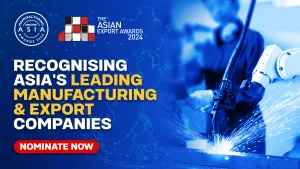
Deloitte's Richard Loi highlights key strategies for successful business growth in the manufacturing and export sectors
Building resilience involves adopting Industry 4.0 practices, embracing sustainability, staying innovative, and maintaining a resilient manufacturing pyramid.
The landscape of the manufacturing and export sectors is a dynamic and ever-evolving one, influenced by various factors that range from technological advancements to global economic shifts. In recent years, automation and digitalisation have played a pivotal role in revolutionising manufacturing processes, leading to increased efficiency and productivity. As industries adapt to these changes, they are better equipped to adapt to changing consumer demands and market conditions.
Amidst this dynamic landscape, challenges, including supply chain disruptions and sustainability concerns, persist. Navigating these complexities requires a combination of adaptability, innovation, and strategic planning as businesses seek to thrive in the ever-changing world of manufacturing and exports.
In Manufacturing Asia’s exploration of the changing landscape of the manufacturing and export sectors, Deloitte Singapore Audit Partner Richard Loi shares his insights on the industry. With over 30 years of experience in public accounting, Richard has led complex global engagements, provided advice on IPOs, and significantly contributed to the growth and resilience of businesses across diverse industries.
Richard has assumed several roles within Deloitte, including serving as the Singapore and Southeast Asia leader for Deloitte Private, where he served the needs of high-net-worth individuals, family businesses, private enterprises, family offices, private equity, and fast-growing companies. He also spearheaded the Industrial Products & Construction industry within Deloitte Singapore’s Audit practice.
In this interview, Richard offers invaluable insights into strategies and practices that can enhance manufacturing companies' export capabilities and global recognition. He also underscores the importance of innovation, sustainability, and resilience in today's competitive global market.
You've advised companies on their IPOs on the Singapore and Hong Kong Exchanges. How can manufacturing companies effectively leverage their IPO journey to bolster their export capabilities and global recognition?
There are several strategies manufacturing companies can take to effectively leverage their IPO journey.
Enhanced Financial Resources for Expansion
Firstly, exporting firms can invest in technology and make technological improvements on a continuous basis, either in their production processes or in terms of their products. This is beneficial for firms to maintain and improve their market position. Improving the production process can also help companies cope with the pressure of keeping costs at competitive levels or improving product quality.
Channelling funds into technology upgrades, increased production capacity, and supply chain optimisation also elevate a company’s export capabilities. These strategies would enable it to meet international demand and deliver products with competitive pricing and quality. Enhanced financial resources should also go towards building new manufacturing facilities to meet global demand beyond their current scope.
Credibility and Transparency
Secondly, going public brings an increased level of transparency and accountability to a company's operations. An IPO can help a company raise its profile with customers, suppliers, and the media, as well as provide it with an opportunity to improve its internal systems and controls. This increases the general operating efficiency of a business and prepares it to comply with the relevant regulatory scheme for public companies.
Companies also stand to gain a stronger foothold in international markets by showcasing their commitment to quality, compliance, and ethical practices.
Access to Global Capital Markets
Companies can raise money through equity and bond offerings when they open their doors to access global capital markets for continued growth and expansion. They can tap into these markets to secure funds for international expansion, strategic acquisitions, and building new manufacturing facilities, or to fund research and development initiatives. In turn, this further strengthens companies’ export capabilities.
As an auditor, what is your advice to manufacturers for them to ensure their financial reporting processes meet stringent standards whilst also showcasing their operational excellence?
There are several steps that manufacturers can take.
Integrated Technology Solutions
Firstly, manufacturers should adopt integrated technology solutions. This requires the use of robust enterprise resource planning (ERP) systems, which streamline operations and provide real-time insights into production, inventory, and costs. When financial reporting is supported by accurate operational data, transparency is enhanced and compliance with standards will follow naturally.
Data Accuracy and Consistency
Secondly, a unified data framework across operations ensures that financial data aligns with operational performance metrics. This data can then support reliable financial reporting and substantiate operational excellence claims, thus building trust with stakeholders. To achieve high-quality reporting, decision-useful information should be provided. The data should be relevant and faithfully represent the economic reality of a company's activities during the reporting period and its financial condition at the end of the period.
Most importantly, faithful representation showcases a company’s operational excellence through the reality of its performance. Stringent standards for quality reporting improve credibility and clarity, allowing for better-informed decisions in budgeting, lending, and investing, which can improve financial and operational stability.
Audits and Reviews
Regulatory oversight of the auditor helps improve reporting credibility, which in turn facilitates corporate investment by increasing companies’ external financing capacity. Additionally, conducting regular internal audits and operational reviews can help identify discrepancies and areas for improvement. They also aid in enhancing financial accuracy and uncovering opportunities to refine operational processes and they can bolster both aspects simultaneously.
Apart from audits and reviews, effective internal control leads to greater operational efficiency by reducing the likelihood of misappropriation of corporate resources and enhancing the quality of internal reports for decision-making.
Stakeholder Communication
Finally, manufacturers can showcase their operational excellence through regular communication with stakeholders, who may demand greater transparency in the business. This is key, as manufacturers can highlight how operational improvements positively impact a company’s financial performance and highlight the tangible link between the two areas.
You were previously involved in accelerating business growth for various enterprises. How can manufacturing companies effectively expand their operations across borders whilst maintaining their operational efficiency and product quality?
Expanding operations across borders and preserving operational efficiency and product quality at the same time requires a well-orchestrated strategy that navigates logistical complexities, cultural nuances, and regulatory variations.
Thorough Market Research
Firstly, companies can plan their expansion by conducting comprehensive market research to understand local preferences, regulatory frameworks, and competitive landscapes. With this knowledge, companies are equipped to tailor operations to meet local demands whilst upholding their commitment to efficiency and quality.
Robust Supply Chain Management
Secondly, the incorporation of technology is key to successful supply chains. For example, Warehouse Management Systems (WMS) help to automate the materials-handling process, improve overall efficiency, and find a way to calculate inventory reorder points accurately. Potential measures to mitigate risk during the backstock of inventory or materials include finding new suppliers, redesigning networks, resetting inventory targets, keeping safety stocks, and sourcing locally or regionally.
Overall, companies should re-evaluate their processes in forecasting, inventory, supplier relationship management, sourcing, and commodity management, as well as manpower and technology. Reviewing their strategic product design and developing a business continuity plan for multiple disruptions can also help to maintain a robust supply chain.
Local Partnerships and Alliances
Last but not least, manufacturing companies should forge strategic partnerships or alliances with local entities. Collaborations with organisations that possess regional expertise can provide invaluable insights into local regulations, consumer behaviour, and distribution networks. In fact, Deloitte reports that 88% of manufacturers agree on the importance of partnerships in reaching their smart manufacturing and digital goals. With supply chains becoming ever more complex, collaboration is crucial for the manufacturing industry.
What strategies can you suggest to manufacturing companies so they may successfully balance the need to innovate their operational processes whilst preserving the legacy of quality and reliability that often defines their products?
There are various strategies that manufacturing companies can use to balance innovation and tradition.
Customer Feedback
Firstly, it is useful to leverage customer feedback to guide innovation efforts. By understanding customer needs and preferences, manufacturers can then introduce operational innovations that align with customer expectations.
Companies should also shift their customer service perspective. Rather than being reactive, forward-thinking manufacturers are increasingly developing proactive solutions to address customer needs. This can be fulfilled through digital tools that offer real-time responses, predictive maintenance, and self-service options that are available anywhere.
With digital workflows, manufacturers can unite core players in their value chain—from suppliers to field technicians—so that service teams can respond quickly to customer concerns and better manage resources. This approach to customer service puts customers at the centre and makes it clear that customer relations rather than sales is the priority.
Technology Integration
Whilst it is important to digitise the supply chain or partner with innovative startups, companies should also preserve the quality and reliability that often define their products. This can be done by implementing an Enterprise Resource System (ERP) that can help align traditional practices with contemporary demands and redefine an organisation's trajectory.
Continuous Improvement Culture
Cultivating a culture of continuous improvement is also crucial to balance innovation and tradition. This way, employees can be encouraged to identify areas for enhancement whilst respecting the company’s core principles of excellence and quality.
Quality Control Integration
Finally, companies should integrate quality control measures into new processes from the outset so that innovations are designed to meet the same stringent quality standards as established operations.
Having audited some of the largest local and international manufacturing companies, could you highlight common trends or practices that have contributed to the success and resilience of these companies?
The success and reliance of companies can be attributed to various practices.
Shoring up resilience
Firstly, it is crucial to build resilience during unprecedented events, such as COVID-19. An example is Industry 4.0, which provides operational responses to aid in mitigating performance loss in times of global crises. Together with digital transformations and smart manufacturing practices, companies are able to improve their flexibility, reliability, robustness, and responsiveness with the implementation of Industry 4.0.
Embracing sustainability
Next, human capital sustainability, environmental sustainability, economic sustainability, and social sustainability provide a company with enhanced resilience. This resilience can be built by leveraging automation for sustainable operations, creating an agile supply chain, building the right culture for resilience, embracing data revolution, and personalising customer relationships.
Building a resilient manufacturing pyramid
Thirdly, a resilient manufacturing pyramid is made up of the foundation of employees and operations, the supply chain, and the market. Hence, manufacturers must manage operations based on what is required at any point in time.
Companies need to respond to foreseen and unforeseen circumstances by ramping up or slowing down their operations to create fit-for-purpose products when demands shift. Maintaining a solid yet nimble manufacturing pyramid would require an immediate shutdown, retooling, resupplying, and restarting as required. The success of an organisation is based on a manufacturer’s ability to stay resilient and keep their pyramids from collapsing.
Securing a company’s foundation by maintaining its workplace efficiency, health, and safety also depends on innovative manufacturing solutions that should be able to test for and find hazardous situations. Visibility into all aspects of the supply chain will drive resilience by pinpointing risk, which in turn will enable scenario planning and provide options for quick pivots.
The future of manufacturing depends on modernised, optimised, and automated processes for operations, supply chains, and production. Every aspect of the manufacturing operation, including workplace health and safety, the environment, asset insights, and predictive maintenance and service, is also key to a company’s success.
Use of data
Finally, data should be used effectively to drive sustainability and innovation, increase market share, improve brand image, and achieve many other benefits beyond operational efficiency and cost savings. Therefore, accelerating the adoption of digitisation and automation in the manufacturing industry is essential to building agility, resilience, and driving business growth.
Your role as a judge reflects your recognition of industry excellence. Can you elaborate on the specific criteria or qualities you look for in standout initiatives within the manufacturing and export sectors that demonstrate exceptional alignment with best practices and innovative approaches?
A company with exceptional alignment with best practices and innovative approaches could benefit not only in areas like greater responsiveness to customer demands, faster turnaround times, reduced waste levels, and reduced downtime, but also for improved product design and quality, greater potential for a wider product range, and streamlined relationships with suppliers and customers.
Fostering innovation
Firstly, it should stand out with its ability to leverage technology and data to enable faster, smarter, and more efficient innovation. Moreover, the ability to use digital tools and platforms to facilitate communication, collaboration, and knowledge sharing across the organisation and beyond is crucial.
Secondly, an outstanding company can use data and analytics to identify opportunities, challenges, and trends, as well as monitor and evaluate its innovation performance. By leveraging technology and data, it will be able to enhance innovation capabilities, reduce risks, and increase its competitive advantage.
Industry excellence also means empowering employees to take ownership and initiative in the innovation process. Such companies should give employees the autonomy, authority, and accountability to make decisions, solve problems, and implement solutions.
In addition, skills training and coaching need to be provided to develop employees’ innovation competencies and confidence. Companies can then unleash employees’ potential, motivate them, and increase engagement and satisfaction.
Sustainable and goal-oriented practices
Thirdly, standout initiatives include ensuring that a company’s supply chain upholds sustainability practices, which are receiving increasing consumer attention. Investments that aim to contribute to environmental sustainability should focus on the introduction of lower-emission production systems, with a focus on both the actual technology and the worker skills required to operate the technology.
Furthermore, new technologies and digitalisation will play an increasing role in delivering resource efficiency. There is a relatively recent subset of studies that focus on new technologies and their role in driving greener, more resource-efficient manufacturing, and companies would do well to look into this.
Finally, given the growing concern for the natural environment from both public and private actors and the clear benefits that new production technologies offer, investors in the manufacturing sector should seek opportunities to increase the diffusion and adoption of new technologies. This can help increase productivity whilst reducing the net impact on the environment. Other sustainable and goal-oriented practices include prioritising related worker skills and providing technical assistance to help firms generate an effective and realistic resource efficiency strategy.



















